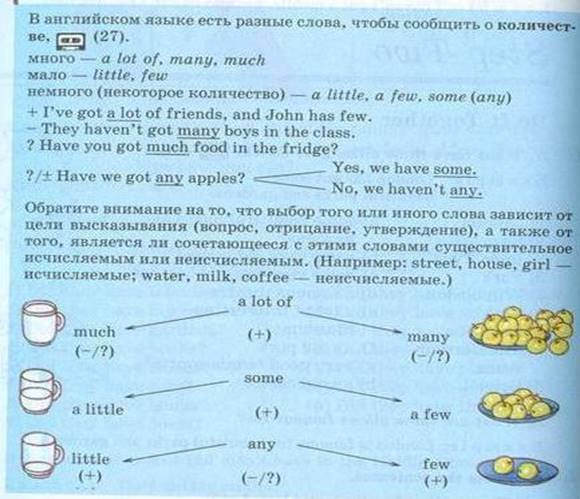
few, little
1. Ann is very busy
these days. She has _free time.
2. You take photographs
when you were on holidays.
3. I'm not very busy today.
But I have got _spare time to do smth..
4. The museum was not very crowded. There were people.
5. Most of the town is modern. There are old
buildings.
6. The weather has been very dry recently. We've had rain.
much, many
1.
Have you got _books?
2. I don't have _ time to do sport.
3. How people came to the meeting?
4. Are there _students in the class?
5. I didn't see of the film because I fell asleep.
6. Howcoffee did you buy?
7. How cups of coffee did you buy?
8. Not students
passed the exam.
9. They didn't give me information.
Exercise 1 - some, any, much, many, a lot of, a little, a few
Choose the correct answer.
When do we use much and when do we use many?
We use:
much with uncountable nouns in singular and
many with countable nouns in plural.
Look at our examples of countable/uncountable nouns.
We often use much/many in questions and negations.
We normally use a lot of/lots of in affirmative sentences.
|
much |
much milk |
|
many |
many glasses
of milk |
Examples:
How much money do
you have? - I don't have much left.
How many dollars do you have? - I don't have many left.
In informal English these questions are often answered with a lot of/lots of. There is no much difference between the two phrases.
Note: We use much or many after as, so and too.
It is wrong to use a lot of/lots with these words.(We
have so a lot of homework to do.)
We have so much homework
to do.
We have too much homework
to do.
a little:
non countable nouns (milk, marmalade, money, time etc.)
a few: countable nouns (bottles
of milk, jars of marmalade, dollars, minutes etc.)
Examples:
He has a little money
left.
He has a few dollars
left.

Скачано с www.znanio.ru
Материалы на данной страницы взяты из открытых источников либо размещены пользователем в соответствии с договором-офертой сайта. Вы можете сообщить о нарушении.